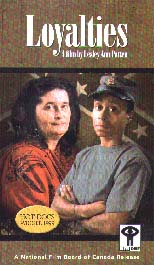|
________________
CM . . . .
Volume VII Number 1 . . . . September 8, 2000
excerpt: "Dr. Ruth Whitehead met graduate student Carmelita Roberston in 1995 when the younger woman came to do research at the Museum of Natural History in Halifax. Carmelita casually mentioned that her relatives had come to Nova Scotia from South Carolina as Black Loyalists in the late 1700's. As she recited the names of her ancestors, Ruth shuddered at the strange familiarity. She had come from South Carolina too."So begins Loyalties, the documentary of two women in search of their common past. Initially, the journey has all the earmarks of a holiday, and Ruth is the tour guide. After all, South Carolina is where she grew up. She is familiar with the area and its history. She has friends and family there. She knows the landmarks, the traditions, the folklore, the culture. Most grating of all to Carmelita, Ruth knows her family's history. And she has access to photographs, ancestral homes, documents, graves, and family stories to reinforce that knowledge. Carmelita, however, does not. She has a mere handful of names. Documentation for slaves is all but non-existent. Denied the right to read and write and carted from one plantation to the next, slaves lost track of their families within the same generation, let alone after 200 years. On the surface, Loyalties's focus is Carmelita's search for her roots. But it soon becomes evident to the viewer that something even more compelling is being examined by this documentary - the legacy of slavery itself. Though evidence of the people who lived as slaves may not have survived the passage of time, the attitudes born during that period, have. Some of those attitudes are blatant, such as the hatred manifested by the Klan through the burning of black churches while Ruth and Carmelita are in Charleston. But generally, the residue of slavery is more subtle. Carmelita is appalled to discover that plantations, the sites of human suffering for thousands of slaves, are now dressed up and shown off as tourist attractions. A slave graveyard to which Ruth takes her has become a housing tract. She is bewildered and perturbed by her own attraction to things confederate because she thinks she should be repelled by them. And she is resentful of Ruth's easy ties with her past. But, despite her obvious advantages, even Ruth doesn't come away unscathed from the journey into the past. Off the coast of South Carolina, she takes Carmelita to Sullivan's Island, once a temporary holding tank for slaves but also the site of many wonderful childhood memories for Ruth. Despite her family's long history as slave owners, she can't bring herself to denounce or even dislike her ancestors, though part of her thinks she should. The most she can manage is to hold her attitude up for examination. Hatred, apathy, denial, discomfort, guilt, confusion, and the need for atonement - these, Carmelita and Ruth discover, are the legacies of slavery. Nearly an hour long, Loyalties is a Hot Docs award winner for 1999. It could be viewed in conjunction with social studies units on Maritime settlement, slavery, the Loyalist Movement, and genealogy, or as a supplement to novels such as Underground to Canada. Multi-layered interpretation of the content opens the door to excellent class discussions. A timeline of the African slave trade, along with a list of related videos, is included in the video case. Closed captioning for the hearing impaired is available through the use of a decoder. Recommended. Kristin Butcher, a former teacher, lives in Victoria, BC, and writes books for children.
To comment on this title or this review, send mail to cm@umanitoba.ca.
Copyright © the Manitoba Library Association.
Reproduction for personal use is permitted only if this copyright notice
is maintained. Any other reproduction is prohibited without
permission.
Published by
TABLE OF CONTENTS FOR THIS ISSUE - September 8, 2000.
AUTHORS |
TITLES |
MEDIA REVIEWS |
PROFILES |
BACK ISSUES |
SEARCH |
ORDER |
CMARCHIVE |
HOME
|
